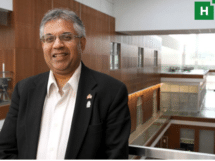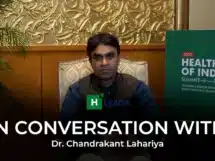Dr Samir Parikh, Consultant Psychiatrist and Director, Department of Mental Health and Behavioral Sciences, Fortis Healthcare, India, underscores the need for greater awareness and open conversations about mental health issues at work, at home, as well as in our virtual and physical lives.
World Mental Health Day is a reminder that mental health is an integral part of our health. An estimated 450 million people around the world currently live with mental illnesses, with 25% of the global population affected by periods of anguish, anxiety, depression and emotional distress at some point in their lives.
Unfortunately, the stigmas and taboos surrounding mental health continue to hinder access to quality care, thereby worsening the state of the mental health landscape in our country. “Mental health is the elephant in the room and we have to rise to the challenge. We need to make people aware that mental health is health,” says Dr Samir Parikh, Consultant Psychiatrist and Director, Department of Mental Health and Behavioral Sciences, Fortis Healthcare, India.
This World Mental Health Day, Dr Parikh sheds light on the importance of mental health interventions at the workplace, the impact of social media and the need for media literacy, the relationship between happiness and healthy minds, among other pertinent issues, in an in-depth discussion with HealthLEADS.
Here are edited excerpts from the interview:
Is it okay to not be okay?
Yes, absolutely! How can anybody be okay 24×7, 365 days a year? We all have our ups and downs, those difficult moments or issues in our relationships, and everyday problems. It is important to understand that all human beings have their own struggles. And to struggle is fine, as long as you are ready to seek help, if needed. Don’t be hesitant to seek help.
What’s the one thing about mental health that you wish people would understand?
Mental health is a part of health. We cannot define health without talking about mental health. We talk about preventive health checkups, but is it possible if mental health is not included? Similarly, we talk about a healthy lifestyle, but how is it possible without mental health being part of it? Without the mental health component, life is incomplete.
How can organisations play a bigger role in fostering better mental health at workplaces?
Mental health outcomes need to be seen as one of the most integral, important outcomes for any organisation. It has to be the focus of every organisation. Mental health needs to be incorporated as a given, as a default, and it should include psychological first aid as training for everyone. This means awareness and access to support and intervention.
The environment at the workplace needs to be conducive to conversations on mental health. Most importantly, it should be devoid of stigma. In fact, mental health outcomes need to be one of the parameters by which organisations should measure their success. A company’s success – based on P&L and EBIDTA alone – is incomplete and superficial, without taking the mental health outcome of its employees into account.
What are some of the risk factors for mental health issues, especially among older adults?
With older adults, we need to understand that they are going through a change and are prone to physical illnesses, which may also affect their lifestyle. Also, most people in that age group are retired or experiencing loneliness and isolation. And then, there are other aspects too – whether it is the degenerative process of the brain, depression or anxiety. So, we need to be sensitive about elder care.
The core aspect of elder care is to provide and build support systems – be it the active role of family, friends or residents welfare associations. The idea is to provide them with the best active lifestyle, based on their age, health and other relevant circumstances.
How does technology impact mental health?
Technology has an impact on us because we are not even able to sleep without our phones! Similarly, if we’ve stopped going out and we prefer meeting our friends virtually, or if we prefer texting over a meeting or calling up our friends, that means technology has beaten us already. When it comes to technology, what’s important is that we should be able to use technology and not let technology use us.
What’s the impact of social media on mental health?
In my opinion, social media is a double-edged sword. There are many advantages of social media, but only if we use it in the right manner. Social media is here to stay. It will become more and more intrusive. It will become even more accessible. Already you see young people struggling to be anywhere without their mobile phones. And these young people are getting younger and younger, day by day.
Social media means being social. The moment you stop being social, that’s a problem. Being social means positivity, connectedness, togetherness, information, enjoyment and fun – but not at the cost of abusing or trolling someone. Crossing the line is not fun; it’s not social either. That’s a concern.
In a utopian world, I would love to have social media platforms raising the bar of responsibility, creating safe spaces, and ensuring that no form of trolling, cyberbullying, or any form of line crossing happens. But I know that it may be easier said and difficult to implement. Therefore, it’s best to empower young minds with education.
In years to come, media literacy will probably be as important as Maths, Science and Environmental Studies. There will be a need to train children, educate them on how to filter fake from real, to make sure that they are not lost in comparisons, and to ensure that they are taking care of their own safety and privacy.
Through media literacy, we can ensure that social media users understand the difference between incomplete, partially correct, and hidden messages. It will help reduce the harmful effects of social media, particularly on the mental health of young users.
Is happiness a state of mind? How does it impact our mental health?
I do believe that happiness needs to be prioritised. And obviously, if you’re happy, it’s unlikely that you’ll get angry or upset at the same time. While you need to work towards happiness, the focus must be on well-being so that you are able to enjoy life to the fullest.
You should be able to feel happiness from within, and you will be able to feel happiness only if you value it. If you are a student, take time out to play with your friends, spend quality time with your family and indulge in some hobbies. If you are a working adult, you still need to take out some ‘me time’, make sure you have a good time with your colleagues and do things you like doing.
Learn to be happy in the moment because if you are happy, you’ll be healthier – physically and mentally. Besides, your relationships as well as your quality of life will be better.
What’s the best way to deal with depression?
Depression is one of the single largest illnesses in the world.
Nearly 300 million people in the world suffer from depression. You can’t prevent it, you can’t change it, and it’s not going to go away without proper treatment.
Often, people with depression struggle with a prevailing sense of sadness and worthlessness, loss of pleasure and interest in things, hopelessness and helplessness, poor sleep and appetite, constant fatigue, or a feeling that life is not worth living. If these symptoms stay with you for about two weeks or more, causing impairment in your daily functioning and the quality of your life, it could be depression.
You should talk to your general physician or family doctor, who will be able to help take care of it, or tell you if you need to consult a psychologist or a psychiatrist.
As a psychiatrist, how do you maintain work-life balance?
The world has changed a lot. If I reflect on my parents and the earlier generations, I feel that their work-life balance was spot on. Back then, even the quality of life was better. If I recall my schooling years, vacations were when we never felt the need to meet our school friends, because we had cousins and friends in the neighbourhood. We had so many open spaces and we played every possible sport that could be played. We were so busy enjoying ourselves. And today’s generation has a mobile phone. What a pity!
I often tell my colleagues to call me instead of sending a text because I’d prefer a phone call over a message, on any given day. Also, I tell them to use words because using emoticons, I feel, take feelings away from humanity. Instead of sending those silly hearts, why not say that you like it?
In my free time, I read a lot to keep my sanity intact. Reading opens your mind to so many perspectives, especially from cross-cultural perspectives. Music is also something which, over the years, has stayed with me. I listen to Hindi classical music. Half an hour recitation by Pandit Jasraj or Pandit Bhimsen Joshi are my absolute favourites!
















